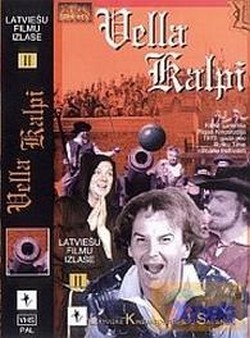The Devil's Servants
You can help expand this article with text translated from the corresponding article in Latvian. (November 2013) Click [show] for important translation instructions.
|
| The Devil's Servants | |
|---|---|
 Latvian-language poster of the film | |
| Vella kalpi | |
| Directed by | Aleksandrs Leimanis |
| Written by |
|
| Produced by |
|
| Starring |
|
| Cinematography | Mārtiņš Kleins |
| Edited by | Elza Preisa |
| Music by | Raimonds Pauls |
Production company | |
| Distributed by | Riga Film Studio |
Release date |
|
Running time | 90 minutes |
| Country | Latvian SSR |
| Languages | Latvian, Russian |
The Devil's Servants (Latvian: Vella kalpi, Russian: Слуги дьявола, romanized: Slugy dyavola) is a 1970 action comedy film produced and distributed by Riga Film Studio. It was written and directed by Aleksandrs Leimanis during the time Latvia was part of the Soviet Union.[1] In 1972, Riga Film Studio released a sequel to this film named The Devil's Servants at the Devil's Mill (Vella kalpi Vella dzirnavās).[2]
The film's setting is the Polish–Swedish War (1621-1625). A trio of mercenaries attempt to prevent the surrender of the city of Riga to the Swedish Army.
Plot
[edit]Riga during the Polish–Swedish War (1621–1625). Swedish forces succeeded in taking the stronghold of Riga after a siege. The Commonwealth ceded Livonia north of the Daugava river, and retained only nominal control over Riga. Three young mercenaries from Courland are fighting to prevent full surrender of Riga city to the Swedish army.
Cast
[edit]- Lolita Cauka as Rūta
- Haralds Ritenbergs as mercenary Andris
- Artūrs Ēķis as mercenary Pēteris
- Eduards Pāvuls as mercenary Ērmanis
- Olga Dreģe as Anna
- Elza Radziņa as Ģertrūde
- Ingrīda Andriņa as Cecīlija
- Baiba Indriksone as Lēne
- Kārlis Sebris as Luteran Pastor Samsons
- Edgars Zīle as Salderns
- Ēvalds Valters as Mayor of Rīga Eks
- Jānis Grantiņš as Daniels Rebuss
- Jānis Osis as Manteifels
- Haralds Topsis as Klāvs Angers
- Valentīns Skulme as Swedish General Svenson
- Zigrīda Stungure as Elizabete
References
[edit]- ^ Anikó Imre (7 August 2012). A Companion to Eastern European Cinemas. John Wiley & Sons. pp. 205–. ISBN 978-1-118-29435-2.
- ^ Peter Rollberg (2008). Historical Dictionary of Russian and Soviet Cinema. Scarecrow Press. p. 435. ISBN 978-0-810-86072-8.
External links
[edit]


 French
French Deutsch
Deutsch